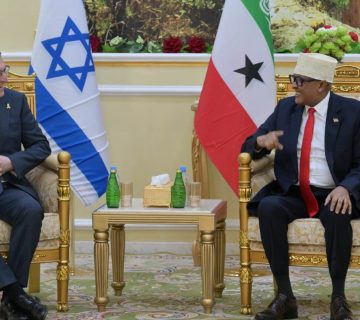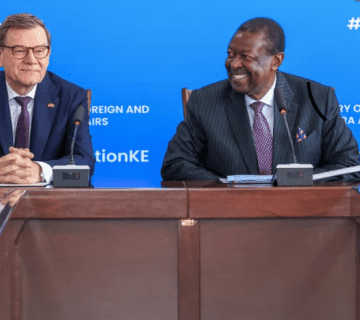On May 9 – 10, 2018, President Uhuru Kenyatta of Kenya met with President Ismail Omar Guelleh of Djibouti in State House, Nairobi. The Secretary of Communication and State House Spokesperson, Manoah Esipisu, said in a communique last week that “the two leaders will most likely discuss cooperation in trade, livestock management, vocational training, promotion and protection of investment, exemption of visa for holders of diplomatic and service passports, and potential collaboration on air transport.” Both Kenya and Djibouti are founding members of the Common Market for Eastern and Southern Africa (COMESA) and the Intergovernmental Authority on Development (IGAD).
Their meeting comes just a day after President Uhuru met with Prime Minister Abiy Ahmed of Ethiopia. It is President Ahmed’s first foreign visit, hinting at the historical ties between the two nations. During this visit, President Uhuru said that “Kenya has always considered Ethiopia as a brother.” Kenya and Ethiopia have enjoyed strong bilateral relations through a Bi-National Commission, the highest international diplomatic organ maintaining structural bilateral cooperation. This has been deepened by a Special Status Agreement between the two countries, defining a special trade relationship between them. The Special Status Agreement puts trade at the center of bilateral relations, and was signed in 2012 and ratified in 2014. The Bi-National Commission and the Special Status Agreement are examples of Kenya and Ethiopia’s strong bilateral relations. Two top diplomatic meetings in one week, both looking to strengthen existing bilateral relations and foster further cooperation. In which context should we view these meetings?
Kenya’s Foreign Policy, drafted in 2014 by the Government, has been hinging on four central themes: Pan-Africanism, Kenyan nationalism, multilateralism, and regionalism. Kenya has been at the forefront of Pan-African and regional projects such as COMESA, IGAD, and the East Africa Commission (EAC). President Uhuru argued in his 2013 inauguration speech that “the future of Kenya depends on not only our national unity but also on deepening our bonds with brothers and sisters in East Africa and Africa as a whole.” This position is reflected in Kenya’s first written Foreign Policy in 2014: “Protect the country’s sovereignty and territorial integrity, promote integration, enhance regional peace and security, advance the economic prosperity of Kenya, project Kenya’s image and prestige, promote multilateralism, and promote the interests of the Kenyan Diaspora.”
In Kenya’s Foreign Policy document of 2014, one finds that it is underpinned by principles of respect for sovereignty and territorial integrity of states, good neighborliness and peaceful co-existence, peaceful settlements of disputes, promotion of regional integration, and respect for international norms, customs, and laws. These ideas are however not new.
The longing for stronger regional ties in the Horn of Africa does not come as a surprise. In 1965, Kenya drafted Session Paper No. 10/1965 on African Socialism, which reflected a desire to Africanize the economy and the public service. According to the Session Paper, the so-called theory of Democratic African Socialism follows three principal conditions: it must draw on the best African traditions, it must be adaptable to new and rapidly changing circumstances, and it must not rest for its success on a satellite relationship with any other country or group of countries. Each of these conditions is informed by the idea of a continent not influenced by foreign ideology.
Session Paper no.10/1965 outlines that economic independence from satellite states does not mean isolation, but rather willingness and desire to strive to independent development and participation in the world economy. In recent years, and with the development of regional organizations such as IGAD, COMESA, and the East African Community (EAC), it has become clear that Kenya aims for stronger regional ties to achieve this goal of independent development and unobstructed governing.
One area where this became clear is in the International Criminal Court (ICC) cases of Uhuru Kenyatta and Deputy President William Ruto, who were both accused of crimes against humanity in the aftermath of the turbulent 2007 elections. Faith Mabera, a researcher with African Diplomacy and Foreign Policy at the Institute for Global Dialogue in South Africa, argues in her academic paper, that after the elections of 2013, Kenya’s diplomatic machinery went into overdrive to crush the cases at the ICC while politically isolating the court across the continent. In October 2013, African Heads of State adopted a resolution urging the UN Security Council to consider a one-year deferral of cases against both leaders. In that same resolution adopted during an Extraordinary Session of the Assembly of the African Union on October 12 2013, it was decided to block the ICC from prosecuting any serving president or senior member of the government. The resolution literally stated “AU’s concern on the politicization and misuse of indictments against African leaders by ICC as well as at the unprecedented indictments of and proceedings against the sitting President and Deputy President of Kenya in light of the recent developments in that country.” Confronted with the risk of global isolation as a rogue democracy and pariah state over the ICC cases, President Uhuru stressed in his 2013 inauguration speech the intention to steer Kenya towards greater autonomy and pan-Africanism.
Fast forward to the latest meeting between President Uhuru Kenyatta and President Abiy Ahmed. Both leaders reiterated “their firm commitment to a rules-based international system with balanced multilateralism and urgent reform of the United Nations System at its core”, according to the joint communique of May 7, 2018. In that same communique, the leaders pledged to champion common African Union positions, especially within the Security Council. In this regard, Ethiopia pledged to support Kenya’s bid for a non-permanent Seat in the United Nations Security Council for the years 2021-2022. Viewed in this light, the meetings with both President Ahmed and President Guelleh can be seen as an attempt towards Kenya’s longing for a Pan-African and regional voice in global affairs, as shown in Session Paper No. 10/1965.



